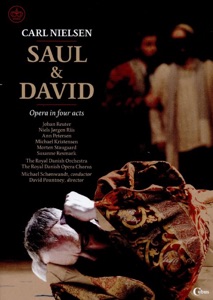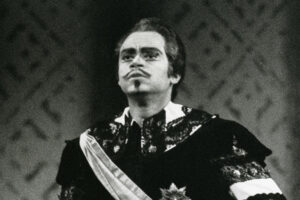

A closer look showed this to be incorrect, it is the first of two operas by Danish composer Carl Nielsen, whose work I am not familiar with at all, Saul and David, which I never heard of, never mind actually heard, before.
I felt flattered that our doyenne La Cieca felt confident in my ability to assess this recording of a production by David Poutney for the Royal Danish Opera of this piece unfamiliar to me, but please bear in mind that this review is written by a complete newcomer to the work.
I am however very familiar with the Old Testament story of King Saul and the boy David who both soothes the King’s madness with his singing and rescues his country by slaying the giant Goliath, the basis of Handel’s magnificent masterpiece Saul.
According to the Bible, the first King of ancient Israel, Saul, was reluctantly anointed by the prophet Samuel, the real power in the country, in response to popular pressure for a monarchy.
Surrounded by enemies, Israel under Saul’s leadership won a victory over the hostile Amalekites. Samuel, speaking for God, instructed the King to “utterly destroy all that they have, and spare them not, but slay both man and woman, infant and suckling, ox and sheep, camel and ass.”
Saul carried out this massacre of the populace and most of their animals but spared the life of the Amalekite king, Agag, and kept the best livestock alive also. For this disobedience to God’s command, the prophet Samuel declared that Saul had forfeited his right to the throne and God now hated him.
This horrible tale of the Almighty displeased with a previous favourite for being insufficiently ruthless at genocide and a pointless, wasteful slaughter of farm animals is too much for the librettist of Nielsen’s opera, Einar Christiansen, who alters Saul’s transgression to performing a sacrifice of a bull at a religious ceremony imploring God’s aid in Israel’s war with its enemies himself, instead of waiting for the prophet Samuel, who is late, to do it.
When the furious elderly prophet appears and curses the King for this disobedience to God’s command, Saul descends into blasphemy and madness. The only thing that soothes him is the sweet singing of the young shepherd lad David, bosom buddy of the king’s son Jonathan.
In gratitude Saul promises David the hand of his daughter Michal. Once again the kingdom is attacked, this time by the Philistines under the leadership of the giant Goliath. David, armed only with a slingshot, kills the giant and rescues his country. This happens offstage in the opera.
The wild acclaim of the populace of David as saviour of their country makes the king insanely jealous and he attempts unsuccessfully to murder the shepherd boy. The prophet Samuel, on his deathbed, revokes Saul’s kingship and anoints David king instead.
Despite his own law making sorcery a crime punishable with death, the king pays a visit to a witch and orders her to call up the ghost of Samuel, but this consultation with the spirit of the dead prophet brings nothing to Saul’s comfort as the spirit informs him that he and his son Jonathan will both soon die and David will be king.
Jonathan is indeed killed in battle and Saul commits suicide. After mourning the dead former King and his son. David is acclaimed new ruler and can marry his beloved Michal. When this four act opera had its premiere in Copenhagen in 1902 it was only a moderate success and has not been widely performed since then.
The original conductor of Nielsen’s opera summed the piece up well I think when he said it was a”highly interesting work, bearing throughout the stamp of an independent gifted artist”, written with “clarity and assurance”. The opera is through-composed, not divided up into numbers such as arias and duets.
“Interesting” is indeed the best word to describe my response to the music, it doesn’t have melodies that stay in your head, but is quite pleasant and effective with skillful writing for a large orchestra and some big choruses.
The parts of the music I enjoyed the most were a big contrapuntal chorus in the third act, and a dramatic orchestral interlude towards the end of the piece depicting the battle in which Saul is defeated and Jonathan killed. I very much enjoyed hearing Danish sung, not a language I have heard set to music very often, it seems to be a mellifluous language without nasal or guttural sounds.
This compelling production by David Poutney for the Royal Danish Opera sets the work in an unspecific Middle Eastern country in present times.
Most of the action takes place on the main stage, an open area with sofas and couches, surrounded by a high rise tenement block of apartments open to the stage, each one containing a television on which the populace watch the actions of their leaders. Projections of battle scenes feature at times.
The only element of this production I really disliked was the dancing that was choreographed to the orchestral introductions to acts two and four. What seemed to be United Nations representatives cavorted and threw sheafs of documents about, with no connection to the rest of the piece.
An excellent cast, orchestra and chorus are led by conductor Michael Schenwandt. Baritone Johan Rueter commands the stage, giving an intense performance as Saul, riveting in his singing and acting.
Tenor Niels Jorgen Riis is not the adolescent slip of a youth, pretty shepherd boy David is often pictured as, but a hefty, beefy, hairy chap with a lyrical voice that is pleasing when he sings the soothing music that comforts the insane King but can sound pushed to its limits when he tries to sing high and loud.
Scary old fanatical prophet Samuel is played and sung with awesome power by bass Morten Staugaard. Alto Susanne Resmark makes a big impression as the chain smoking, bicycle riding Witch of Endor, visited by the mad King in her gypsy caravan.
Excellent soprano Ann Petersen as Michal manages both lyrical and dramatic music with assurance and no hint of strain, I would like to hear more of her.
I must admit that at times watching this piece I was reminded so strongly of Handel’s Saul because of the nearly identical characters and plot features that I had a hankering to switch over and listen to Handel’s version instead. But I am glad to have seen and heard Nielsen’s version in this performance and think that others, too, will find it an interesting and rewarding experience.
























Comments